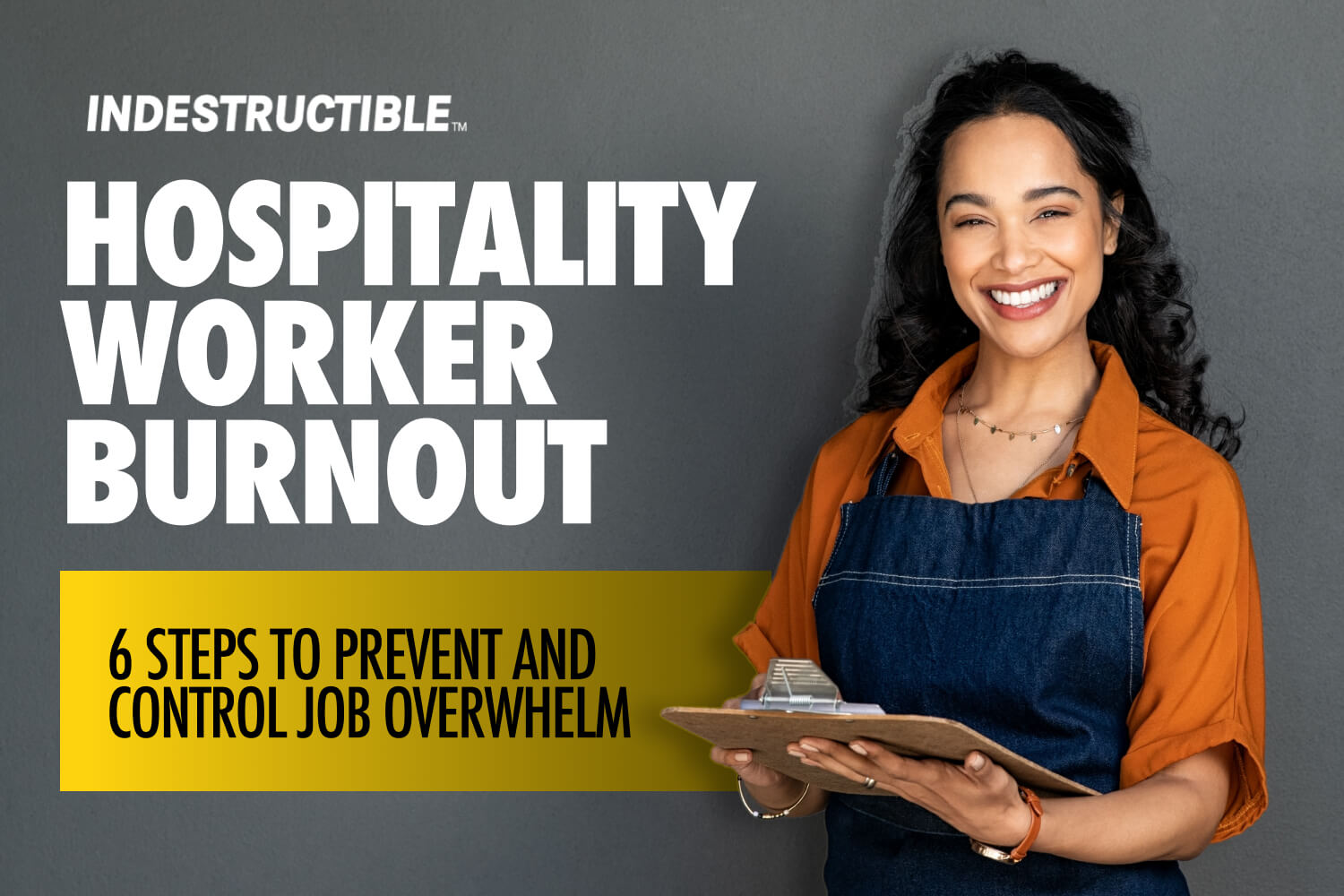Workplace overwhelm happens when there's too much stress on the job. For hospitality workers within the service industry, travel season and times of local events can make it seem like you're being pulled in 100 directions at once. Other times, there are not enough meaningful tasks throughout your day, and the days drag on forever, creating more stress.
People managing lodging, food and drink service, events, theme parks, bars, and tourist agencies can feel the sting of burnout. No one is excluded. Stress affects everyone, from leaders to workers, through all levels of the business.
Here are some of the factors contributing to stress in the hospitality industry and some ways you can get through those moments healthier and happier.
Do you love what you do?

First, be honest with yourself. If you enjoy what you do, improving overwhelm in your job will be much easier to accomplish. This is good news. This means you can make positive changes that help you enjoy your job even more, enjoy life more, and get more from your career.
The steps following this section should help you manage overwhelming situations better and move you closer to feeling optimistic and upbeat.
If you don't enjoy what you do, take a deeper, honest look inside yourself and picture the ideal outcome you’ll achieve when you improve your work situation. Do you see yourself enjoying a different role within the hospitality industry, and that's where your heart really lies? Or, do you see yourself working in a different style of a role outside of the hospitality industry altogether?
Determine what you need to get to where you want to be. Sometimes it's setting aside 10% of your income to save up to take time off and look for another job or get training to qualify to apply for the job you want. Sometimes when you just want a different role, devoting a portion of your time away from work to training for that role will help you get there.
Research what it takes to do what you want and then plot a course to get there. Seek guidance from someone working in the field or a counselor who guides students to get you started, if necessary.
Step 1: Set a goal to be impressive.
When you feel your talents are not utilized enough at work, your heart and mind are not properly stimulated. This "work boredom" can cause you to lose focus, and the most basic duties become challenging.
Can you handle taking on more shifts or tasks during your day?
Are you in a situation where you can ask for more training on the job?
Can you take additional relevant training on your off hours that add to your abilities?
Do you have ideas on how to improve the business in any way?
Bring the above to your manager's attention and show you're willing to take the initiative and be a top performer on the job. As an added bonus, your actions can also help improve working conditions for others.
Step 2: Prioritize and plan your task load.

When there's so much going on that you feel completely overwhelmed, it can be from one of two situations:
- Your job is dumping so many duties upon you because of a busy time, staff shortage, or both.
- You're doing multiple "simple" tasks that are all clamoring for attention at once.
Develop a strategy to deal with your challenging day and reduce your work stress. When you take charge, acknowledge that you're a professional, and logically think things through without emotions interfering, you'll gain confidence and get more done in your day.
You work the office or desk with multiple tasks:
- Stop panicking. Breathe deeply and slowly, and take control of your thoughts.
- Create a to-do list: List the tasks you need to finish in number of importance and, when applicable, the deadline.
- Adopt a habit of relaxing whenever possible, and take a moment during your workday for meditation or purposeful deep breathing.
- Be honest, but open and friendly if you can't be the one to serve a guest, such as if your hotel is fully booked. If possible, give them ideas for an alternative solution to the problem you can't solve for them.
You serve customers, such as being a waiter or waitress:
- Arrive looking nice and presentable.
- Get plenty of sleep to keep the friendly attitude and generous tips flowing.
- Memorize the menu as much as you can. Chat with the cook or bartender about how specials are made to help pitch them to customers better.
- Write down all orders instead of relying on memory. It only takes a moment and makes the customer feel secure that you're listening.
- Listen to your customers and ask them to repeat if you don't understand them. Don't guess and risk having an angry customer.
- Be assertive and in control of your table. (Yell to get everyone's attention if needed. Nicely, of course.)
- Feel and be professional. Let your patrons know you need their cooperation to make everything go smoothly. If they're all trying to give you their orders at once, let them know that you're here to help them have a good time, and you want to have a good time too. Then suggest you all work together to make this happen. You control the flow.
- Try to get along with the people you work with and make new friends.
Step 3: Admit the overwhelm.
Don't deny it. You'll only make it worse.
Understand what triggers your feelings of overwhelm.
- Write down everything that is making you feel overwhelmed. Get it all out in the open.
- Break down larger tasks into smaller ones, so you steadily check items off your to-do list and feel less anxiety.
- Set boundaries appropriate to why something triggers your anxiety. (If your employer isn't one you can coordinate with to improve your work culture and your boss expects you always to be available and work long hours, you may need to reevaluate if you're staying in this position long-term.)
Separate your tasks according to importance.
- Is it important and urgent? Place the task in the “Do it now” section.
- Is it important but not urgent? Set a time to complete it by.
- Not important but urgent. Is this something you can delegate to someone else? (There's no shame in asking for help.)
- Not important and not urgent. Why is it on your list? Delete it if you can.
Step 4: Be nice to yourself and give yourself space to deal with things.

Take a break.
- Take a moment just to stop and breathe.
- Take lunch with a coworker and talk things through.
- Seek advice from your supervisor on how you can deal with your frustrations.
- Take time for yourself with a mini-vacation when you can.
Distract yourself from your burnout so you can evaluate your situation and see things more clearly. This will help you discover positive actions you can take to improve your job satisfaction.
Step 5: Get some exercise.

Regular exercise helps you deal with stress and helps correct the effects stress causes on your mind and body. If you had a routine in the past, get back into it. If you're not sure what you like, here are some ideas:
Grab a 30-minute walk. If you live or work in a geographically beautiful area or close to a park, this is one of the most relaxing mind-clearing exercises you can do. Talking to yourself and working through your frustrations as you walk is okay.
Join a class for High-Intensity Interval Training (HIIT). This is a great routine exercise for people who are short on time. You'll often be in and of the gym in under an hour.
Take up yoga.This popular exercise helps you zone out for an hour and relieve the built-up tension. It can help battle fatigue, inability to focus, lack of interest, tension, headaches, and anxiety caused by work.
Go running. Soak up the beautiful views in your favorite area while you think about your work issues on a good run. Developing this exercise routine will help you feel more energized and see things more clearly.
Take up indoor cycling or join a spinning class. Release those endorphins and give negative emotions the boot with this exercise routine. It's low-impact and a great form of cardio-fitness.
Step 6: Don't stress-eat.

Many people like to fall back on comfort foods when they're stressed because their favorite foods make them feel mentally better for a moment. This isn't always best for your mental and physical well-being.
You can improve your resilience to stress and anxiety by eating less highly processed foods and more whole foods. Add more vegetables, fruits, beans, fish, nuts, and seeds to your diet.
Skip the questionable energy drinks and sodas and drink more water. When you need something different, reach for something recommended for battling stress, like Chamomile tea, warm milk, tart cherry juice, green tea, fresh juice, and coconut water.
Take your life back from burnout.
If you let it, burnout will take over your life.
You'll feel terrible emotionally and physically. You'll feel hopeless and inadequate. Even if you love your work, burnout can make you start to no longer enjoy it. You'll lose the desire to socialize or just live your life in general.
Take the time to create a plan to alleviate any current overwhelming feelings you have from work. Try joining a group online of friendly individuals working in the same field as you are and discover how others maintain a positive attitude through similar troubles.
When you actively deal with burnout, you'll feel better and work better. Your job performance will dramatically improve, perhaps opening doors to more opportunities that were closed to you before. Your personal life will improve with the confidence and happiness you gain.
Start by making small changes and add more positive actions to your work and home life over time. You'll be surprised at how positive an effect just a few small changes can make.
Footwear for the hospitality industry.
Protect your feet with safety shoes designed to protect you from slippery surfaces, hot oil spills, water penetration, and falling objects. Indestructible Shoes carries comfortable, attractive safety shoes for the hazards you'll find in restaurants, hotels, events, or any other workplace environment within the hospitality industry.









